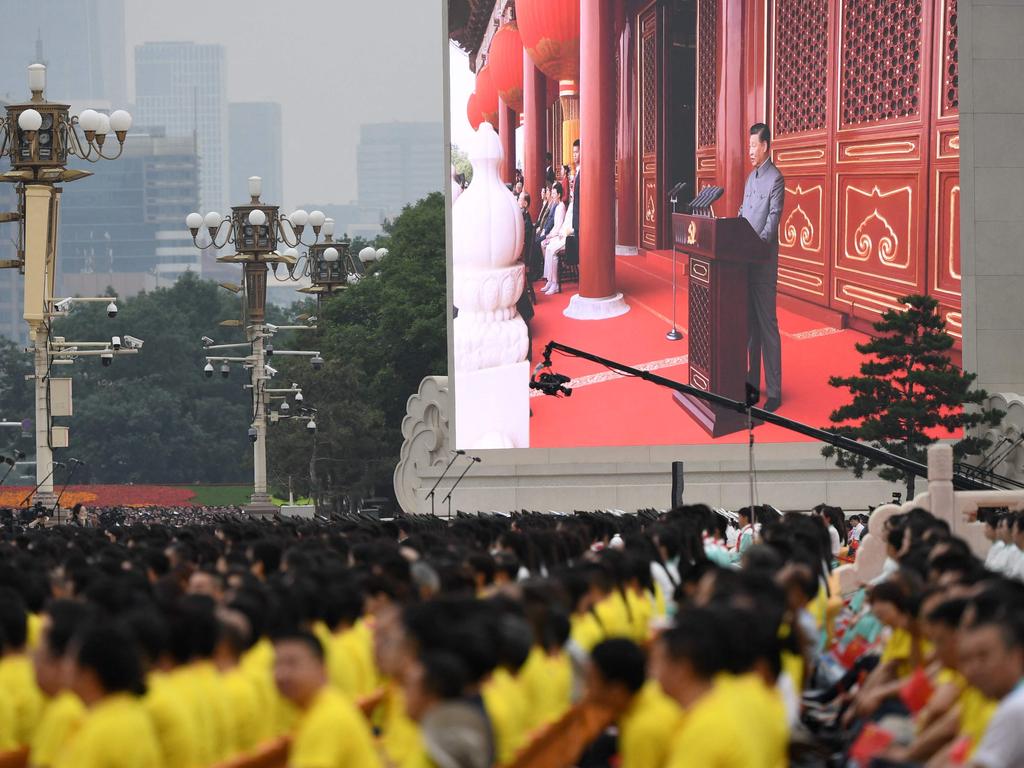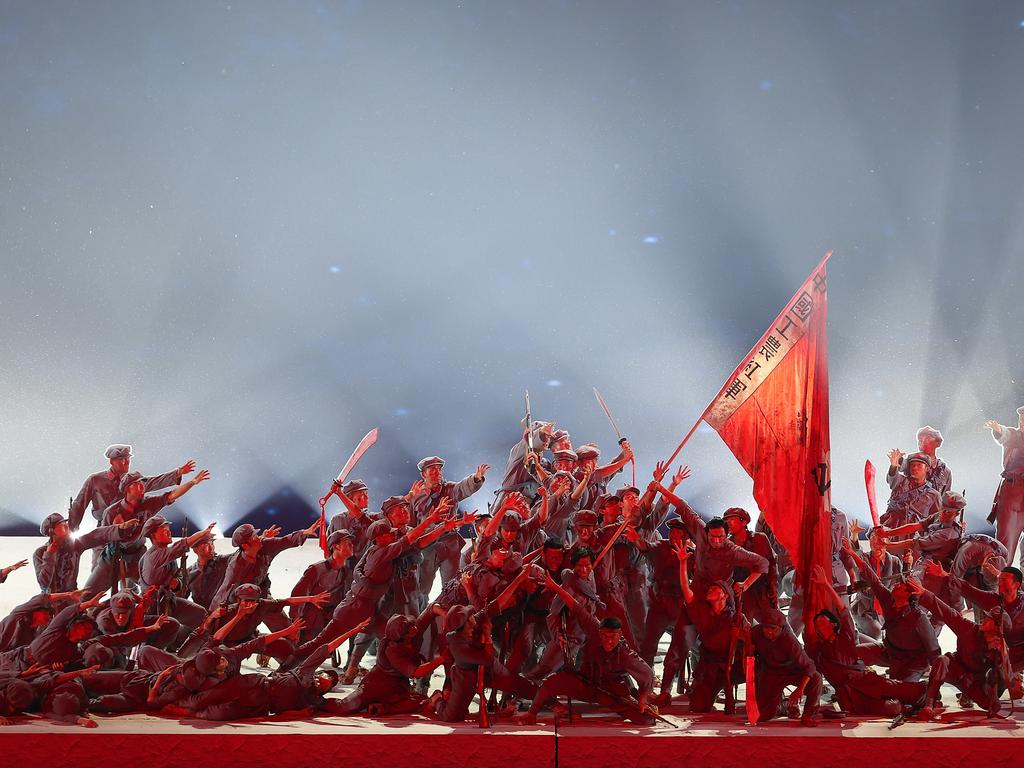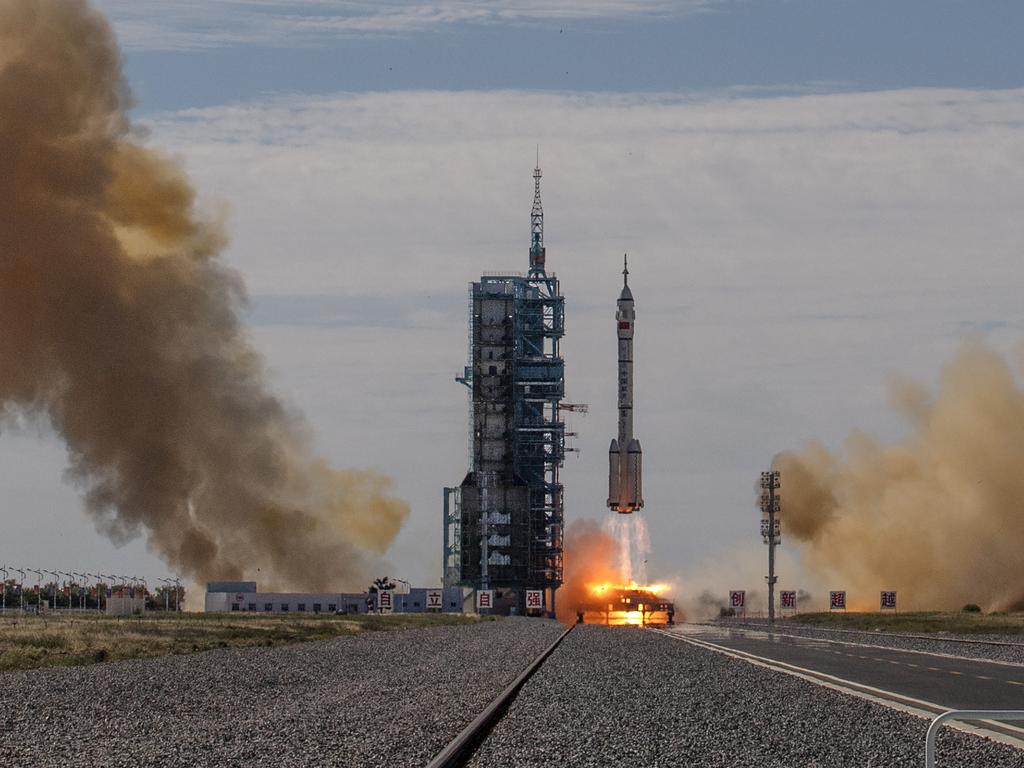Xi Jinping warns of a ‘wall of steel’ for China’s critics
Xi Jinping warns the international community China will never be ‘bullied, oppressed or subjected’ by foreign forces in a speech marking CCP’s 100th anniversary.
Chinese president Xi Jinping has threatened a “wall of steel” will confront any country that tries to bully his nation’s rising power, in a stridently nationalistic speech to mark the 100th anniversary of the Chinese Communist Party.
Wearing a grey Mao-suit and standing next to a painted hammer and sickle, Mr Xi warned the international community that China would never be “bullied, oppressed or subjected” nor “intimidated by threats of force”.
“Anyone who would attempt to do so will find themselves on a collision course with a great wall of steel forged by over 1.4 billion Chinese people,” Mr Xi said to huge applause from an audience of thousands of party supporters gathered in Tiananmen Square.
Mr Xi, who is alo the party’s powerful general-secretary, said the Chinese nation did not have aggressive or hegemonic traits “in its genes”.
But Mr Xi, 68, said the development of the party state’s military forces was a clear priority as it embarked on its second century — one it which it is determined not to be pushed around by America or its allies.

“We must accelerate the modernisation of national defence and the armed forces,” Mr Xi said from a podium on Beijing’s Gate of Heavenly Peace.
Australian Strategic Policy Institute executive director Peter Jennings said the Chinese leader’s “blood and bayonets” language heightened the chance of conflict in the region. “There are some serious risks here because at the end of the day it’s not a paper tiger,” Mr Jennings said. “Rhetoric of this type can tip populations into supporting conflict which ultimately becomes massively disastrous for them — but bravely they go marching off to war.”
The most likely flashpoint is over Taiwan, whose “reunification” with the mainland Mr Xi said was the party’s “historic mission”.
He said a strong military was required to deter attempts at formal independence by Taiwan, the island home of 24 million people that Beijing regards as part of its territory.
“We must take resolute action to utterly defeat any attempt toward ‘Taiwan independence,’ and work together to create a bright future for national rejuvenation,” Mr Xi said to the biggest cheer in his one-hour-long speech.
Richard McGregor, an expert on elite Chinese politics at the Lowy Institute, said that even though the speech was primarily aimed at a domestic audience, the language was “brutally honest” about the path the party was on, especially regarding Taiwan and the region.
“They still have scores to settle with history,” Mr McGregor said.
China’s leader bristled at attempts to separate the world’s most successful Leninist party from Chinese people. Mr Xi said the party, the Chinese state and the Chinese people were indivisible and warned that any attempts to divide the party from the people was “bound to fail”.
“The more than 95 million Party members and the more than 1.4 billion Chinese people will never allow such a scenario to come to pass,” he said.
Mr McGregor, author of The Party: The Secret World of China‘s Communist Rulers, said it was a rebuff to politicians such as Defence Minister Peter Dutton and former US Secretary of State Mike Pompeo who had attempted to single out the party for criticism.
“If anybody, especially western politicians, thought they could neatly separate the Chinese people from the ruling party, and talk to one and not the other, then Xi’s speech is a reminder, that as far as he is concerned, they are one indivisible whole,” Mr McGregor said.
“The party, the country and the citizenry are all collapsed in a single category, although in real life that hardly seems possible.”
No Australian diplomats were present for Mr Xi’s speech. Their counterparts from Australia’s partners and allies including New Zealand and Japan were there for the address, which had been heavily promoted in state media.
Foreign Minister Marise Payne declined to comment on the speech or the party’s birthday.
Mr Xi said China would continue the assertive approach to international relations, which has included a trade retaliation campaign on more than $20 billion of Australian exports.
“We are eager to learn what lessons we can from the achievements of other cultures, and welcome helpful suggestions and constructive criticism,” Mr Xi said. “We will not, however, accept sanctimonious preaching from those who feel they have the right to lecture us.”
Mr Xi explicitly enlisted “overseas Chinese” into the country’s great rejuvenation project.
During his more than eight years in power, China has increased the overseas influence activities of the party’s United Front Work Department.
Australia has been a key testing ground for those operations. A report by Human Rights Watch this week said Beijing had overseen the bullying, threatening and spying of dozens of Chinese and Hong Kong students on Australia’s university campuses
“In the course of our struggles over the past century, the party has always placed the united front in a position of importance,” Mr Xi said.
A survey by the Pew Centre released on Thursday underlined the entrenched gulf between the views of much of the world and how the rising power sees itself in the Xi era. Pew found negative sentiment about China at record levels in its most powerful rival, the US, its most important European partner, Germany, and in its own neighbourhood.
Thursday was also the one-year anniversary of the Beijing-authored national security law, which has stamped out critical voices in Hong Kong’s political system and media.
With Hong Kong’s nominal leader Carrie Lam watching on in the Tiananmen audience, Mr Xi defended his administration’s hard line approach to the former British colony.
“While protecting China’s sovereignty, security, and development interests, we will ensure social stability in Hong Kong and Macao, and maintain lasting prosperity and stability in the two special administrative regions,” he said.
After Mr Xi finished his speech with the party’s clenched fist salute, the gathered comrades joined him in singing the communist anthem, The Internationale. Thousands of pigeons — brought to Tiananmen Square in red flag-festooned lorry trucks — were released into the overcast sky.
China’s official news agency Xinhua said more than 70,000 people attended the ceremony, many wearing rain ponchos over their uniforms. The festivities began with a fleet of helicopters flying overhead in formations in the shape of “100”. Then 56 cannons representing China’s 56 ethnic groups were fired 100 times as 222 People’s Liberation Army soldiers marched in a flag-raising ceremony.








To join the conversation, please log in. Don't have an account? Register
Join the conversation, you are commenting as Logout